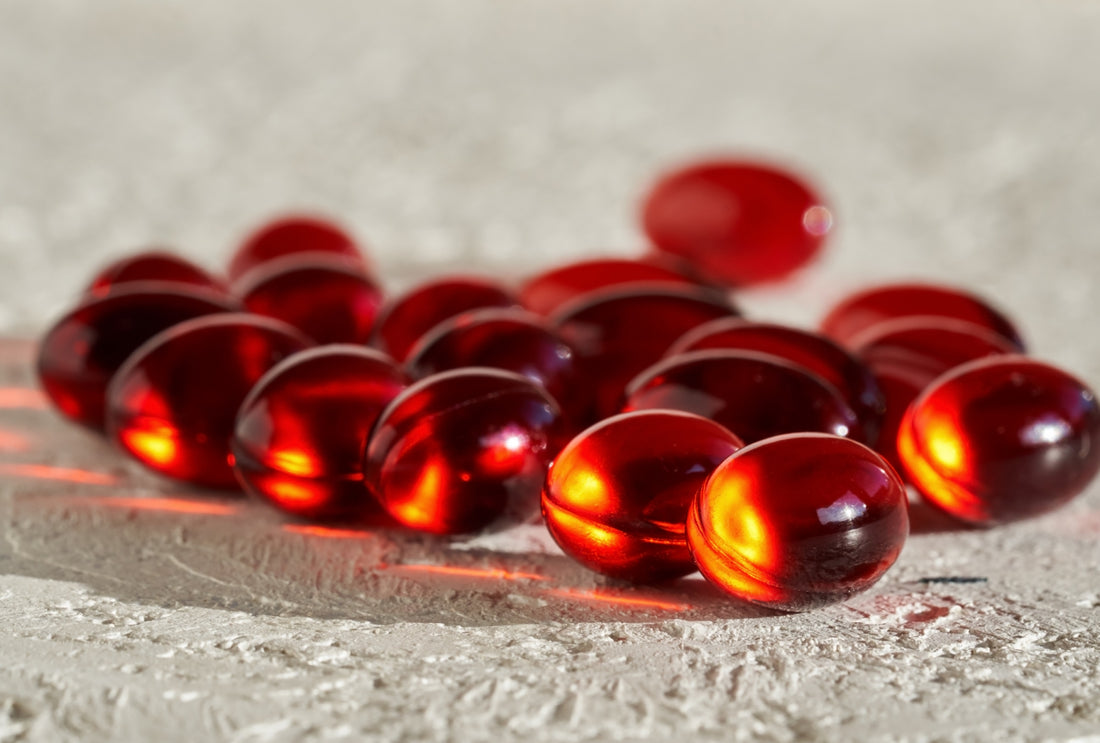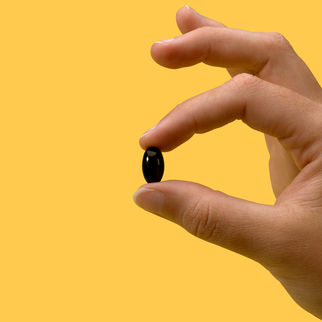Many people have embraced krill oil as a supplement to support their overall health and wellness, and for good reason. Still, as with any popular supplement, it raises the question of whether it is all hype or whether you really should take it. The nutrients offered by krill oil can be a great supplement to a healthy diet.
However, taking krill oil each day may not be the exact solution you have been hoping for. Today, we’re giving you the truth behind how much krill oil you should take each day and whether or not krill oil is the right supplement for you to begin with. Plus, we’ll discuss the role algae plays in nutrition, and why it may be a promising alternative to krill.
What Is Krill Oil?
Based on the name, it won’t be much of a surprise that krill oil comes from creatures called krill. Although they are often confused for tiny fish, krill are tiny, pinkish-red crustaceans that live in the ocean. Krill are an important part of the food chain in the ocean, as they serve as a food source for penguins, whales, seabirds, and large fish.
Krill oil is made by extracting the oil from the tissues of these tiny creatures and refining it to form a nutritional supplement. Krill oil supplements are sold in the form of capsules of oil or just in a bottle.
Krill oil is often taken as a supplement to a diet to support a healthy heart and promote cardiovascular health. Many people take krill oil as an alternative to fish oil because they both provide valuable omega-3s while krill oil also provides powerful antioxidants.
What Is Omega-3?
Omega-3s are a type of polyunsaturated fatty acid found in the body. These fatty acids can serve several roles in the body. Essential fatty acids can provide a source of energy for the body, but they also serve as a building block for cells in the body.
Omega-3s can make an important part of cell membranes, which means they can play a key part in how cells interact with each other and support the healthy function of systems in the body.
The three main types of omega-3s are:
- Alpha-linolenic acid (ALA), an omega-3 precursor
- Docosahexaenoic acid (DHA)
- Eicosapentaenoic acid (EPA)
ALA is a type of short-chain fatty acid, while DHA and EPA are long-chain fatty acids. This difference means that DHA and EPA omega-3s are broken down and used differently by the body. These two fatty acids also seem to offer the most benefits of the three types of omega-3.
ALA is the easiest of the three to find in a standard diet, and it can also be converted into DHA and EPA in the body. However, since a very low percentage of ALA is converted to DHA and EPA, you should get these two sources directly from food.
Is Krill the Only Source of Omega-3s?
Though krill oil is a very common source of omega-3s, it is not the only source. The appeal of krill oil stems from the fact that it is one of few options containing DHA and EPA, the key forms of omega-3 that the body can readily use. Many sources of “omega-3” really only contain ALA, the precursor to true omega-3 in the form of DHA and EPA.
That said though, Nannochloropsis algae, which we use at iwi life, is naturally rich in DHA and EPA — all without the fishy burps or environmental concerns. More on that later.
What Are the Benefits of Taking Krill Oil?
Krill oil can offer several benefits for our health, making it an increasingly popular supplement for people to embrace. Many of the benefits of taking krill oil come from the supplement's high omega-3 content. Krill oil contains both DHA and EPA omega-3s, making it one of the few sources of both of these fatty acids.
By providing an easy source of both these fatty acids, taking krill oil may help to:
- Maintain healthy heart function
- Maintain healthy cholesterol and blood triglyceride levels already within the normal range
- Support a healthy blood pressure
- Promote healthy cognitive function
- Support joint health
- Support emotional wellness
On top of the benefits that come with the omega-3 content in krill oil, the supplement is also rich in a carotenoid, or compound, called astaxanthin. This carotenoid is responsible for the pinkish-red color of krill and serves asa beneficial antioxidant in the body.
Astaxanthin helps support the healthy aging of cells and cellular health overall by adding extra protection against damage. Astaxanthin is particularly beneficial for supporting the health of the eye.
How Much Krill Oil Should You Take Each Day?
The amount of krill oil you take each day depends on the amount of DHA and EPA you should take. There is no set daily recommended value of how much DHA and EPA you should take per day, so how much krill oil you should take can be difficult to answer. However, experts recommend taking between 400 and 500 mg of DHA and EPA per week.
Regardless, you should always stay within the recommended dosage on any krill oil supplement. Of course, the value of krill oil relies on its high omega-3 content, so it is not necessary to take each day.
You can also take other forms of these essential fatty acids instead. However, aiming for the range of 400 to 500 mg of DHA and EPA is a good rule of thumb no matter where you choose to get them.
Are There Side Effects of Krill Oil?
Before taking krill oil, it is important to know what signs to look out for to determine if krill oil may not be a good idea for you. Krill oil is generally considered safe and has few serious side effects. However, it can still offer some potential side effects that can result in discomfort.
Some of the most common possible side effects are:
- Nausea
- Reduced appetite
- Indigestion
- Bloating
- Diarrhea
Another inconvenient side effect of krill oil is fishy burps and unpleasant breath. Again, this is not a serious side effect, but it is enough to discourage people from taking krill oil as a supplement. People with a distaste for fish may also not enjoy taking krill oil supplements just due to the taste alone.
In addition to the general side effects, there are other concerns. Krill oil is not a viable option for people with seafood or shellfish allergies as it may trigger an allergic reaction. If you are considering taking krill oil, consult your doctor to see if it is a good idea.
What Are the Environmental Concerns of Krill Oil?
In addition to the potentially uncomfortable side effects, krill oil is also not great for the environment. Of course, making this supplement relies on taking krill out of the ocean, which can cause significant disruption to ocean ecosystems. As discussed earlier, krill are an important part of the food chain, serving as an important part of the diet of many ocean creatures.
Krill oil production takes hundreds of thousands of these creatures out of the ocean each year. Taking these valuable creatures out of the oceans has sweeping effects on marine life that do not have enough food, leading to the decline of fish populations as well as whales, sharks, and other predators. Krill also help the environment by consuming phytoplankton and execreting carbon in the form of pellets that sink quickly into the deep sea.
Between the potential side effects of krill oil and the extensive environmental risks, many people advocate for moving away from krill oil. Fortunately, there is a much more environmentally-friendly option.
What Are Some Alternatives to Krill Oil?
Krill oil offers many great benefits but may be outweighed by the drawbacks, especially since there are alternatives for obtaining DHA and EPA omega-3s. Instead of krill oil, many people choose to take fish oil or eat fatty fish, like salmon, mackerel, and tuna.
However, fish and fish oil have the same drawbacks — they are not an option for those with allergies and aversions, and they lead to negative environmental impacts.
For a supplement that provides benefits without disadvantages, you can turn to algae. Algae is rich in both DHA and EPA omega-3 fatty acids as well as astaxanthin, offering many of the same potential benefits as krill or fish oil. Algae is also rich in antioxidants, which help support healthy cells in other ways.
To top it off, algae has nowhere near the environmental impact of krill oil as it can be produced in a sustainable way without harming any precious ocean creatures in the process. Since algae is an aquatic plant, it is also a great option for vegans and those on a plant-based diet, helping them get valuable omega-3s in their diet.
iwi life provides a powerful alternative to krill oil with our algae-based Vegikrill supplement. This supplement provides you with a combined 200 mg of DHA and EPA omega-3 fatty acids as well as the antioxidant astaxanthin.
Even better, this supplement is completely plant-based with a foundation made from omega-3-rich algae. As a result, you receive all the potential benefits of consuming krill oil without the drawbacks.
The Benefits of Krill Oil — Without the Krill
Krill oil can offer many potential health benefits with its high omega-3 and antioxidant content, but krill oil is a harmful option for the environment and can be a generally unpleasant option to take for those who dislike or can’t eat seafood. Fortunately, algae provides an excellent alternative.
For all of the benefits of krill oil without the drawbacks, turn to iwi life for algae-based nutrition. Try our Vegikrill supplement to replace krill oil in your diet, and enjoy all the same potential health benefits without the drawbacks.
Sources:
Essential Fatty Acids | Linus Pauling Institute
Overfishing: The most serious threat to our oceans |Environmental Defense Fund



















